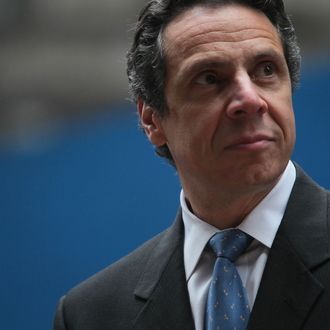
Follow the money. The pithy investigative advice Woodward and Bernstein attributed to Deep Throat is still brilliant and important, whatever else the Watergate reporters may have embellished. The latest example is the Times investigation into the connections between casino companies and the Committee to Save New York.
To backtrack for a moment: Allies of Andrew Cuomo created the Committee in 2010 as a way, they said, to counteract the influence of labor unions during Albany’s budget battles. It proved an effective strategy. The Committee became a deep-pocketed lobbying and advertising vehicle that was ostensibly independent from the governor but was nevertheless completely supportive of his agenda. Elected officials do need a way other than the bully pulpit to make their case, and doing so is expensive. CSNY, which has spent $12 million already, in some ways anticipated the super-PACs that are now dominating the presidential campaign. The problem with both, though, is that they shield the sources of their cash.
When CSNY shifted from arguing in favor of property tax caps to advocating for slot machines and poker tables, things got even murkier. The gambling industry, pushing to expand legalized wagering in the state, pumped $2 million into CSNY’s account late last year, just as the governor was developing a plan to make additional casinos a central element of his economic development package. Did Cuomo get behind the casino idea because of the casino company donations to the committee? The timing may look suspicious, but Cuomo was already moving toward expanding wagering across the state. More likely, the Committee was just a convenient piggy bank for advancing mutual interests.
Yet even well short of outright corruption, Cuomo has a significant problem: He looks too clever for using the Committee to dance around disclosure requirements, and the mess damages the image he’s built since his days as New York attorney general: a reform politician taking on Albany’s pay-to-pay culture. Yesterday Cuomo’s office sent the Times a 2,200-word letter defending the relationship, but it isn’t enough to argue legalities when the whole thing smells bad. The governor knows this. So was it a coincidence, or more cleverness — a preemptive attempt to restore his can’t-be-bought brand — that Cuomo jumped out of bed with Genting, the company behind the Queens mega-casino proposal, days before the Times ran its casino money story?
One thing this episode has made clear, yet again, is that when pols get mixed up with gambling it always ends badly. But then you don’t have to be Woodward and Bernstein to recognize that fundamental truth.





























